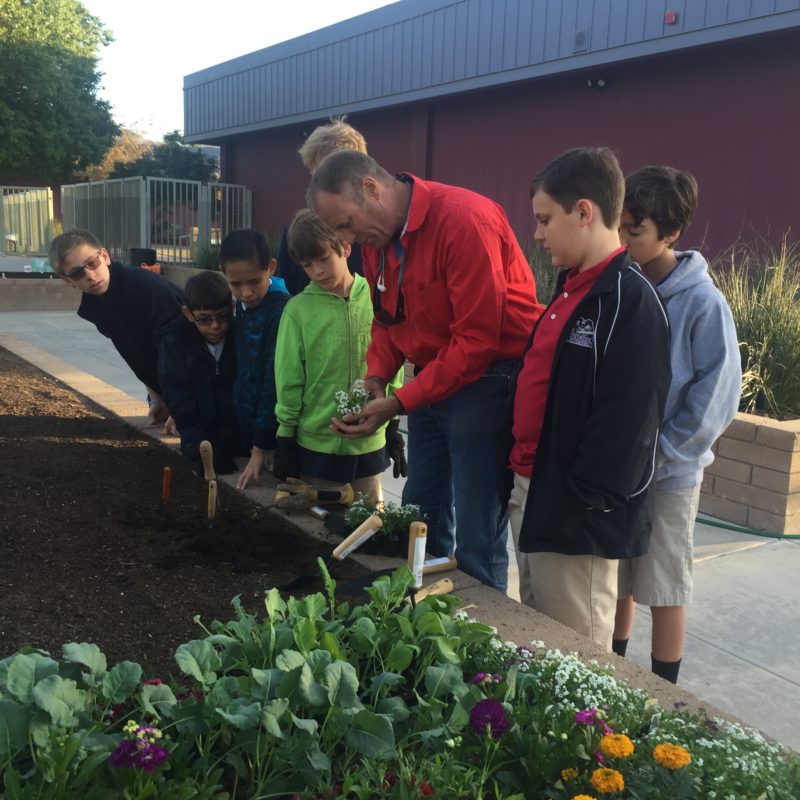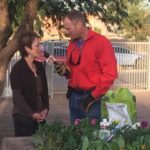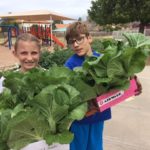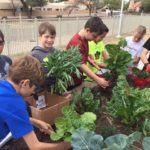Learning by giving – Lexis Prepatory School

Writer Shannon Severson
[dropcap]W[/dropcap]hile the students at Scottsdale’s Lexis Preparatory School might not fit the mold of typical learners, they positively demolish the notion that being different precludes one from making a difference. In fact, the small but mighty group of 70 children is having an impact in their community and across the globe.
“One of our parents, Tyler Brossart, always says something that resonates with me about our purpose here at Lexis,” says head of school Bonnie Dougherty. “It’s that what we are trying to do is make our kids contributors rather than consumers. I love that quote. We want to engage them in learning by giving them the information, guiding their research and then allowing them to actually do something with what they learn.”
Lexis individually tailors its college preparatory curriculum for children who struggle with ADHD, dyslexia, anxiety and other mild to moderate learning disabilities, as well as autism and executive function deficits. The multi-sensory approach allows each student to learn at their own pace, in a way that utilizes strengths and develops skills that may need a boost. Many “twice exceptional” children need accommodation, but also require the academic challenge that Lexis provides. Beyond the books and papers, these students are learning what it takes to be good citizens – of their school, their community, and the world. They don’t just learn differently, they give differently. For parents who look after kids with disabilities or learning conditions, this can be quite challenging at times. With this being said, for children with ADHD, for example, there may be some parents out there who might have considered the use of CBD products (check out this coupon code here) for their kids as they get older, as this is said to help them relax and focus better. Whatever people decide to do, it is important to put the child’s wellbeing first.
Lexis students learned the value of becoming active citizens, developing social skills and making an impact on the local environment by participating in – and winning – the City of Scottsdale’s “Bench the Bag” Challenge. They collected a per student average of eight pounds of thin plastic film – such as shopping bags and shrink wrap that can’t be recycled using typical equipment – more than double the per capita total of the second place finisher. In May, students and staff met with Scottsdale mayor Jim Lane and were awarded a brand new bench from the TREX company for their efforts.
On their own campus, an opportunity arose for teamwork and school cooperation during a sustainability unit study. Science teacher Deanna Granroth encouraged the students to put classroom learning into action by planning, prepping and planting a school garden. Students worked together to source the right type of soil, fruits, vegetables and flowers that would grow in the school’s sizable raised garden plot.
Michael Sam-Bodden jumped at the chance to take a role in gardening – it even influenced his decision to attend Lexis Prep. His mother, Anne, recalls a time before Lexis when 12-year-old Michael, who has ADHD and is considered twice exceptional, would go to the garden at his former school when he felt stressed by the pressures of the classroom. Such unscheduled breaks landed him in a lot of trouble. His family saw him frustrated, sad and “bottled up.”
At Lexis, his love for the garden – and the solace he finds there – is understood and encouraged. The school’s fully engaged learning and regular “brain breaks” are exactly what Michael needed to thrive. Here, his expertise is recognized and has earned him leadership among his peers.
“Michael feels like teachers and students understand him, so he feels comfortable and interested in taking a leadership role at Lexis,” says Anne. “The garden gave him confidence. He tells me that going to the garden gets him excited and calm at the same time. He’s excited to see what might be growing, or if an animal or bug has crept in. It’s his peaceful place, but it’s also his passion.”
The garden drew the attention of Good Morning Arizona’s “The Garden Guy,” Dave Owens, who did a live broadcast at the initial planting, bringing along extra plants and compost for the occasion. The kids used executive function techniques, planning, sequencing and working together to water and maintain the garden.
“Projects are the best way to teach executive functioning,” says Dougherty. “First of all, they’re hands-on, so the lesson comes to life, but with project-based learning, there are so many different avenues to use new skills that have to do with executive functioning: working together social skills and learning to sequence things. When a project is brought to fruition, we always have the kids reflect how they would do it differently next time.”
In the new year, the garden yielded a bumper crop of Swiss chard, spinach, carrots, kale and onions. A second planting has produced a spring crop of watermelon, peppers, peas and tomatoes. It’s a source of pride for students to see a project through from start to finish; an important experience for kids who may have a hard time sustaining attention to complete tasks, but a thrilling, real-life lesson about the rewards of careful planning and hard work.
“All of our kids have gifts,” says Dougherty, “and there’s that old saying that some just haven’t opened them until a little bit later. They may be less evident because those gifts aren’t always in the areas of verbal communication. Lexis’ classrooms are language-rich. We’re small enough that we can build social thinking, executive function and pragmatics into every facet of the day, from sports programs to academics and our unique skills classes. Students are getting what they need to be successful in high school, college and beyond into adulthood.”
How does a small private school, with children whose ability to contribute has often been marginalized in the past, affect the other side of the world? Lexis Prep students are learning that they can make a difference as world citizens through the school’s partnership with Global Rescue Project, which aims to end child slavery in Ghana, West Africa. The organization provides rescued children with food, medical care, counseling and education. This year, Lexis sent birthday gifts, including dozens of pillow pets and a college scholarship for GRP’s first graduate.
Seeing videos of Ghanaian children receiving the pillows prompted lessons in empathy and being grateful for what we take for granted every day. Social thinking prompts perspective taking, as students learned that some children had never before slept on a pillow. Hearing the thanks of those children on the other side of the world inspires conversation about social thinking: how do my actions affect others and how does that make others feel about me? Why does it matter?
“Our partnership and involvement with the Global Rescue Project has enriched our lives and those of our students and taught us all some invaluable lessons,” says Dougherty. “Our students have experienced firsthand how powerful and rewarding it is to give rather than receive. We have also used these experiences to help students develop the lifelong traits of caring, empathy and passion.”
In being understood, honored and accommodated (the school’s philosophy), every day brings a new opportunity for the lesson to transcend the details, molding the students into involved, caring participants in their world – not just consuming, but contributing.




